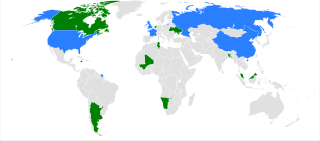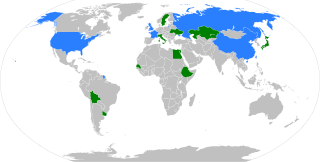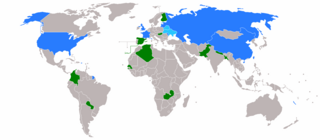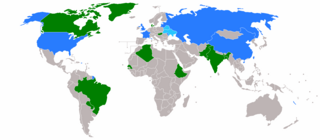
The United Nations Regional Groups are the geopolitical regional groups of member states of the United Nations. Originally, the UN member states were unofficially organized into five groups as an informal means of sharing the distribution of posts for General Assembly committees. Now this grouping has taken on a much more expansive and official role. Many UN bodies are allocated on the basis of geographical representation. Top leadership positions, including Secretary-General and President of the General Assembly, are rotated among the regional groups. The groups also coordinate substantive policy and form common fronts for negotiations and bloc voting.

The 2012 United Nations Security Council election was held on 18 October 2012 during the 67th session of the United Nations General Assembly, held at the Headquarters of the United Nations in New York City. The elections were for five non-permanent seats on the UN Security Council for two-year mandates commencing on 1 January 2013 to replace the five countries whose terms expired. The countries elected were Argentina, Australia, Luxembourg, the Republic of Korea, and Rwanda with Luxembourg being elected for the first time.

The 2013 United Nations Security Council election was held on 17 October 2013 during the 68th session of the United Nations General Assembly, held at United Nations Headquarters in New York City. The Assembly elected Chad, Chile, Lithuania, Nigeria, and Saudi Arabia for five non-permanent seats on the UN Security Council for two-year mandates commencing on 1 January 2014. The following day, Saudi Arabia announced that it was declining the seat, accusing UNSC of using "double standards" and being unable to resolve important issues in the Middle East. A second round of voting therefore took place on 6 December, in which Jordan was elected to the council in lieu of Saudi Arabia.

The 1997 United Nations Security Council election was held on 14 October 1997 at United Nations Headquarters in New York City during the 52nd session of the United Nations General Assembly. The General Assembly elected five non-permanent members of the UN Security Council for two-year terms commencing on 1 January 1998.

The 2015 United Nations Security Council election was held on 15 October 2015 during the 70th session of the United Nations General Assembly, held at United Nations Headquarters in New York City. The elections are for five non-permanent seats on the UN Security Council for two-year mandates commencing on 1 January 2016. In accordance with the Security Council's rotation rules, whereby the ten non-permanent UNSC seats rotate among the various regional blocs into which UN member states traditionally divide themselves for voting and representation purposes, the five available seats are allocated as follows:

The 1999 United Nations Security Council election was held on 14 October 1999 during the Fifty-fourth session of the United Nations General Assembly, held at United Nations Headquarters in New York City. The General Assembly elected Bangladesh, Jamaica, Mali, Tunisia, and Ukraine, as the five new non-permanent members of the UN Security Council for two-year mandates commencing on 1 January 2000. Notably, Ukraine was elected to the Council for the first time as an independent nation.

The 1991 United Nations Security Council election was held on 16 October 1991 during the Forty-sixth session of the United Nations General Assembly, held at United Nations Headquarters in New York City. The General Assembly elected Cape Verde, Hungary, Japan, Morocco, and Venezuela, as the five new non-permanent members of the UN Security Council for two-year mandates commencing on 1 January 1992.

The 1976 United Nations Security Council election was held on 21 October 1976 during the Thirty-first session of the United Nations General Assembly, held at United Nations Headquarters in New York City. The General Assembly elected Canada, the Federal Republic of Germany, India, Mauritius, and Venezuela, as the five new non-permanent members of the UN Security Council for two-year mandates commencing on 1 January 1977. Both Mauritius and West Germany were elected members of the Council for the first time.

The 2016 United Nations Security Council election was held on 28 June during the 70th session of the United Nations General Assembly, held at United Nations Headquarters in New York City. The elections were for five non-permanent seats on the UN Security Council for two-year mandates commencing on 1 January 2017. In accordance with the Security Council's rotation rules, whereby the ten non-permanent UNSC seats rotate among the various regional blocs into which UN member states traditionally divide themselves for voting and representation purposes, the five available seats were allocated as follows:

The 2017 United Nations Security Council election was held on 2 June 2017 during the 71st session of the United Nations General Assembly, held at United Nations Headquarters in New York City. In addition to the regular elections for five of the non-permanent seats on the UN Security Council, there was by-election for a sixth seat held by Italy who relinquished its seat at the end of the year as part of a term splitting agreement with the Netherlands. The regular elections are for two-year mandates commencing on 1 January 2018; the by-election is for the remainder of Italy's term. In accordance with the Security Council's rotation rules, whereby the ten non-permanent UNSC seats rotate among the various regional blocs into which UN member states traditionally divide themselves for voting and representation purposes, the five regularly available seats are allocated as follows:

The 2022 United Nations Security Council election was held on 9 June 2022 during the 76th session of the United Nations General Assembly, held at United Nations Headquarters in New York City. The elections are for five non-permanent seats on the UN Security Council for two-year mandates commencing on 1 January 2023. In accordance with the Security Council's rotation rules, whereby the ten non-permanent UNSC seats rotate among the various regional blocs into which UN member states traditionally divide themselves for voting and representation purposes, the five available seats are allocated as follows:

The 1973 United Nations Security Council election was held on 15 October 1973 during the Twenty-eighth session of the United Nations General Assembly, held at United Nations Headquarters in New York City. The General Assembly elected the Byelorussian SSR, Cameroon, Costa Rica, Iraq, and Mauritania, as the five new non-permanent members of the UN Security Council for two-year mandates commencing on 1 January 1974. This was the first election of Cameroon, Costa Rica and Mauritania and the only election of Byelorussian SSR into the council.

The 1971 United Nations Security Council election was held on 23 November 1971 during the Twenty-sixth session of the United Nations General Assembly, held at United Nations Headquarters in New York City. The General Assembly elected Guinea, India, Panama, Sudan, and Yugoslavia, as the five new non-permanent members of the UN Security Council for two-year mandates commencing on 1 January 1972. It was the first election of Guinea and Sudan into the council.

The 1969 United Nations Security Council election was held on 20 October 1969 during the Twenty-fourth session of the United Nations General Assembly, held at United Nations Headquarters in New York City. The General Assembly elected the Burundi, Nicaragua, Poland, Sierra Leone, and Syria, as the five new non-permanent members of the UN Security Council for two-year mandates commencing on 1 January 1970. It was the first time Burundi, Nicaragua and Sierra Leone were elected members of the council.

The 1968 United Nations Security Council election was held on 1 November 1968 during the Twenty-third session of the United Nations General Assembly, held at United Nations Headquarters in New York City. The General Assembly elected Colombia, Finland, Nepal, Spain, and Zambia, as the five new non-permanent members of the UN Security Council for two-year mandates commencing on 1 January 1969.

The 1967 United Nations Security Council election was held on 6 November 1967 during the Twenty-second session of the United Nations General Assembly, held at United Nations Headquarters in New York City. The General Assembly elected Algeria, Hungary, Pakistan, Paraguay, and Senegal, as the five new non-permanent members of the UN Security Council for two-year mandates commencing on 1 January 1968. Algeria and Senegal saw their first election into the council.
The 2023 United Nations Security Council election was held on 6 June 2023 during the 77th session of the United Nations General Assembly, held at United Nations Headquarters in New York City. The elections are for five non-permanent seats on the UN Security Council for two-year mandates commencing on 1 January 2024. In accordance with the Security Council's rotation rules, whereby the ten non-permanent UNSC seats rotate among the various regional blocs into which UN member states traditionally divide themselves for voting and representation purposes, the five available seats are allocated as follows:
The 2024 United Nations Security Council election will be held in mid-2024 during the 78th session of the United Nations General Assembly, held at United Nations Headquarters in New York City. The elections are for five non-permanent seats on the UN Security Council for two-year mandates commencing on 1 January 2025. In accordance with the Security Council's rotation rules, whereby the ten non-permanent UNSC seats rotate among the various regional blocs into which UN member states traditionally divide themselves for voting and representation purposes, the five available seats are allocated as follows:
The 2026 United Nations Security Council election will be held in mid-2026 during the 80th session of the United Nations General Assembly, held at United Nations Headquarters in New York City. The elections are for five non-permanent seats on the UN Security Council for two-year mandates commencing on 1 January 2027. In accordance with the Security Council's rotation rules, whereby the ten non-permanent UNSC seats rotate among the various regional blocs into which UN member states traditionally divide themselves for voting and representation purposes, the five available seats are allocated as follows:















